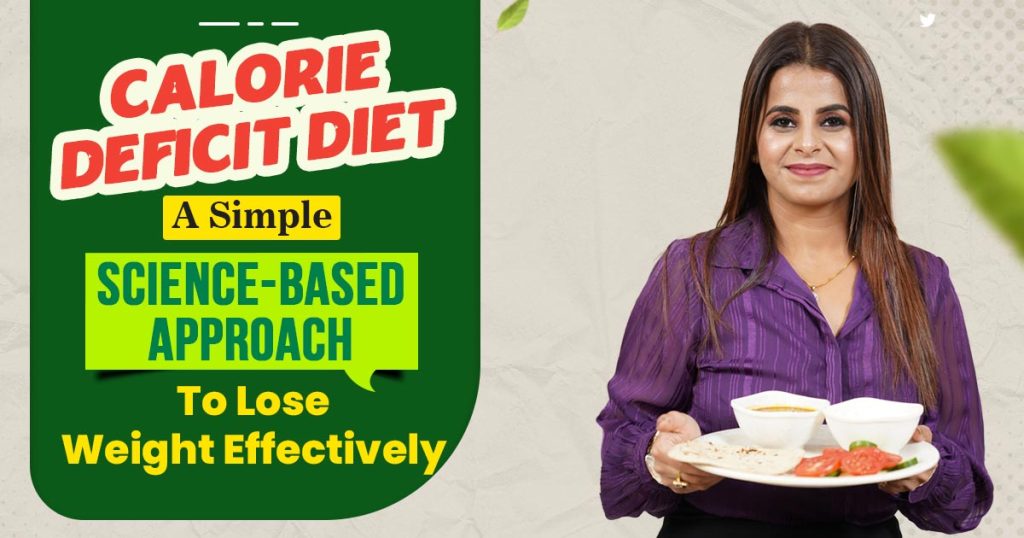
Calorie Deficit Diet: A Simple Science Based Approach To Lose Weight Effectively
- Dietitian Sheenam
- April 25, 2025
Stepping into the journey of losing weight can be overwhelming but sometimes, the simplest approach can be the most effective. One such step is following a calorie deficit diet which is a science-backed method and can give you guaranteed results.
What is a Calorie Deficit Diet?
The simplest definition of a calorie deficit is you burn more calories than you consume. While you are in the midst of your weight loss program or you have just begun, a calorie deficit diet will play a generous amount of role in your journey. Calorie deficit can be anywhere from 500 to 1200 depending on a number of factors.
Before starting a calorie deficit diet, you must know how many calories your body requires. This number depends on your:
- sex
- Age
- Physical activity levels
- Height
- Weight
- Body composition
Now you can go on to the next step to calculate your calorie deficit.
How Do You Calculate Your Calorie Deficit?
According to research, a calorie deficit of 300–500 is sufficient to lose 0.5 kgs per week and this works best for most people. You need to re-evaluate this constantly as you lose weight and progress. Let’s begin to calculate your calorie deficit to lose weight.
- Firstly, you need to calculate how many calories your body needs to support your daily activities. This is called maintenance calories. You can use any online calorie calculator to get this.
- Once you find your maintenance calories, subtract 500 calories from the number to determine your goal for daily intake of calories. This calorie deficit for weight loss is generally safe and applicable to anyone starting their weight loss journey. For example, if you find your maintenance calories to be 2,000 per day, your new daily calorie goal would be 1,500.
- You need to keep a check on your weight as once you start losing weight, your maintenance calories decrease which will further impact your calorie deficit.
How To Create A Calorie Deficit Diet?
The weight loss is not just the calorie in and calorie out process, but a fusion of many things going on simultaneously. Starting a calorie deficit diet will give you a right path and a motivation to jump into your weight loss journey. You may have to change what you eat and drink daily to achieve this. The focus will be eating foods that are rich in nutrients but low in calories which means consuming more of minimally processed or whole foods. Majority of your calorie deficit diet should include:
- Non-starchy vegetables: Spinach, broccoli, cauliflower, peppers, mushrooms, tomatoes etc.
- Starchy vegetables: Potatoes, peas, sweet potatoes etc.
- Fruits: Berries, apples, pears, melon, grapes, bananas, citrus fruits etc.
- Poultry and Meat: Chicken, beef, Turkey etc.
- Plant based protein sources: Tofu, protein powders
- Whole grains: Brown rice, oats, quinoa, barley, millet etc.
- Legumes: Chickpeas, kidney beans, lentils, black beans etc.
- Healthy fats: Avocado, olive oil, unsweetened coconut etc.
- Dairy products: Plain Yogurt, cheese etc.
- Seeds, nuts and nut butters: Almonds, pumpkin seeds, walnuts, sunflower seeds, natural peanut butter etc.
- Unsweetened plant based milks: Coconut milk, Almond milk
- Non calorie beverages: Coffee, Green Tea etc.
You can mix and match these foods to create a balanced diet that works well for you. Remember to eat plenty of fiber rich foods combined with lean protein. Protein is the most important component as it builds strength and promotes fat loss.
What To Avoid In A Calorie Deficit Diet?
Highly processed foods and added sugar are the enemies of weight loss. They should be kept far away for a healthy weight loss and overall health. Other partners in crime are:
- Fast food: chicken nuggets, fries, pizza, hot dogs etc.
- Refined carbs: white bread, sugary cereals, white pasta, bagels, crackers, corn chips, etc.
- Added sugars: sugary snack bars, candy, baked goods, candy, table sugar, agave, etc.
- Fried foods: potato chips, deep-fried foods, doughnuts, mozzarella sticks, etc.
- Diet and low-fat foods: diet bars, low-fat ice cream, low-fat chips, diet frozen meals, low-calorie candies, etc.
- Sweetened beverages: soda, fruit juice, energy drinks, flavored milks, sweetened coffee drinks, etc.
You don’t have to be very rigid and kill yourself for consuming any of these once in a while but you need to be disciplined and stop yoursel from indulging in them regularly. You may have to cut back on several habits that are hindering your weight loss and it may be difficult, but it will definitely be worth it as you will see yourself in your best shape and health overtime.
Ways To Lose Weight Effectively Combining Calorie Deficit Diet
1. Exercise
The more inactive you are, the more problems you face in the weight loss journey. Incorporate 150 minutes of moderate activity per week and never forget strength training to maintain a healthy lifestyle and weight. Simple activities are proven to be most calorie burners which include:
- walking
- taking the stairs instead of the elevator
- hiking
- playing sport
- Cycling
2. Practice Mindful Eating:
- Eating slowly
- Paying attention to your hunger and fullness cues.
- Avoiding distractions while eating.
These can help you become more aware of your food intake and potentially reduce overeating.
3. Stay Hydrated
Drinking enough water helps you feel full and it also boosts your metabolism, potentially aiding in weight loss.
4. Guidance From a Dietician
You may feel confused while creating a perfect plan for a calorie deficit to lose weight, a certified and best dietitian for weight loss will help you by:
- Giving a personalised plan.
- Taking care of nutritional value.
- Avoiding potential risks in calorie deficit diet.
- Rather than crash diets, focusing on long term lifestyle changes.
- Supporting and keeping you motivated with expert advice.
Conclusion
Following a calorie deficit diet is one of the most effective and sustainable ways to lose weight. It’s not just about eating less, but about making smarter food choices and building habits that support long-term health. To get the best results, consider seeking guidance from the best dietician for weight loss, who can help you create a personalized calorie deficit to lose weight safely and effectively. With the right plan, discipline, and support, your fitness goals are absolutely within reach. Stay focused, stay balanced, and let your journey to a healthier you begin.
Also Read:
Tags
Share This
Recent Posts
Categories
- Anti-Inflammatory Diet (1)
- Balanced Diet Meal Plan (1)
- Belly Fat (1)
- Blood Pressure (2)
- Bridal Diet Plan (1)
- Clinical Nutrition (4)
- Constipation Remedies (1)
- Detox (3)
- Diabetes (1)
- Diet Planning (1)
- Diet Plans (12)
- Dietitian (1)
- Disease Management (1)
- Eating (1)
- Exercises (1)
- Foods (3)
- Glowing Skin (1)
- Healthy Hair (1)
- Healthy Recipes (5)
- Irregular and Scanty Periods (1)
- Low Sodium Diet (1)
- Medical Nutrition Therapy (1)
- Metabolism (1)
- Natural Remedies (2)
- Nutrient Deficiency (1)
- PCOD/PCOS (2)
- Sleep (1)
- Thyroid Health (2)
- Uncategorized (1)
- Weight Loss (7)
- Women Health (1)


